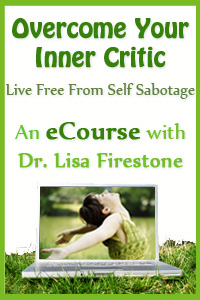
Most of us are all too familiar with those nagging thoughts that seem to surface every time we decide to push ourselves and try something new. Although the worry and self-doubt we experience when we take on a challenge, interview for a job, apply to a school or ask someone out can be met with relief once we’ve accomplished that specific task, it’s never long before new worries set in: Will I be able to do the job? I’ll never make it at this school, or I’m going to blow it on the first date.
While a certain amount of worry is to be expected in a transition, it is important to question how much of our concern and doubt is natural and how much it is the result of an internalized critic referred to as the critical inner voice. The critical inner voice represents an internal enemy and may be thought of as a threat to self-actualization and self-fulfillment. It tends to foster inwardness, distrust, self-criticism, self-denial and limitation, addictions, and a generalized retreat from one’s goal-directed activity. Internalized voices attacks affect every aspect of a person’s life: one’s mood and psychological state of mind, attitudes and prejudices, personal relationships, mate selection, style of relating to others, choice of school or career, and work performance.
The critical inner voice is defined as a well-integrated pattern of negative thoughts toward one’s self and others that is at the root of an individual’s maladaptive behavior. It represents an overlay on the personality that is not natural or harmonious but learned or imposed from without. The critical inner voice is not an actual voice that speaks to us, rather it is experienced as those self-limiting thoughts and attitudes that exists in all of us and keep us from achieving our goals.
Watch a Whiteboard Video on The Critical Inner Voice
We can observe this voice at work in various areas of our lives; it tells us not to get too close in our relationships or go too far in our careers. These thoughts can be cruel and berating: Who do you think you are? You’ll never succeed. You’re not like everyone else. No one will ever care about you. These thoughts can also be deceptively calm and soothing: You’re just fine on your own. The only person you can rely on is yourself. You should reward yourself with one more piece of cake. Just have one last drink; it will make you feel better.
Whether cruel or soothing, these thoughts often hold us back from going after what we want and lead to our acting in ways that hurt us. Giving in to the voice and acting on its advice only creates more attacks. The voice that told us to have that extra piece of cake is now tearing into us for having no self-control. So how do we conquer this critical inner voice?
For 30 years I have studied, along with my father, psychologist and author Robert Firestone, the roots of the critical inner voice. He developed “voice therapy” as a way for people to identify and separate from this inner critic by understanding the origins of the critical inner voice and then taking actions to go against it, actions that are goal directed and that represent a person’s true point of view. The steps involved in this therapy process are detailed in a book he wrote for mental health professionals, Voice Therapy, as well as in a book he and I co-authored for the general public, Conquer Your Critical Inner Voice. The steps include:
Step One: Identifying What Your Critical Inner Voice is Telling You
In order to challenge their negative attacks, people must first become aware of what their critical inner voice is telling them. They can do this by identifying an area of their lives where they are especially critical of themselves and then pay attention to what the criticisms are. As a person discovers what the self-attacks are, it is valuable to articulate them in the second person, as “you” statements. For example, instead of saying “I feel so lazy and useless,” a person would say “You are so lazy. You’re useless.” When people utilize this format in voice therapy, they are encouraged to express their critical thoughts as they hear or experience them, and this often leads to them accessing the hostility that underlies this self-attacking system.
Step Two: Recognizing Where Your Voices Come From
After people verbalize their critical inner voices in this manner, they often feel deeply, and they have insight into the source of their voice attacks. They have unusual clarity, as they begin to recognize that the content and tone of their voice attacks is old and familiar; their voices are expressing attitudes that were directed toward them as children. They will often say things like, “That’s what my father used to say” or “That’s the feeling I got from my mother,” or “That was the atmosphere in my home.” Recognizing where their voices originated helps people develop compassion for themselves.
Step Three: Responding to Your Critical Inner Voice
In the third step of voice therapy, an individual answers back to the voice attacks. People who have thoughts like, “You’re so stupid. No one wants to hear what you are thinking. Just sit in the background and keep your mouth shut!” may respond with statements like, “I am not stupid! What I have to say is valuable and worthwhile. A lot of people are interested in me and care about what I think.” After responding, it is important for people to make rational statements about how they really are, how other people really are, and what is true about his or her social world. They may say something like, “The world isn’t a place where everyone else is brilliant and I’m the only stupid person. I’m not in elementary school anymore; no one is grading us. The truth is that people aren’t all that smart, and I’m not stupid. We are basically the same: interesting people who have interesting things to say about what they are thinking and experiencing.”
Step Four: Understanding How Your Voices Influence Your Behavior
After expressing and responding to their voices, people are naturally curious and eager to understand how these patterns of self-defeating thoughts has influenced their past and impacts their present-day behaviors. For example, the person with the voice that he or she is stupid may recognize times when he or she acted less capable or confident as a result of having heard that self-attack. Having this understanding of how the critical inner voice has affected their actions is helpful when people want to change specific self-limiting behaviors.
Step Five: Changing Your Self-Limiting Behaviors
Once people have identified the areas in which they limit themselves, they can begin to change themselves. They can do this by taking two actions: to not engage in the self-destructive behavior that is being encouraged by the critical inner voice and to increase the positive behaviors that go against the recommendations of the voice. For example, a person who is shy can stop avoiding social interactions and can make a point of striking up conversations with people.
Strange as it may sound, identifying and countering critical inner voices can be harder than it seems. With change comes anxiety, and getting rid of an inner critic is no exception. Often, when people begin to challenge their negative attacks and act against their directives, the attacks grow stronger and more intense. There are people who have gotten used to their critical thoughts and, although unpleasant, they are comfortable “living with” them. One woman even described them as keeping her company. When she stopped having as many self-attacks, she said she felt lonely and scared to be without them. Some people mistakenly believe that their critical inner voices are what keep them in line, so they fear that if they do not heed them, they will act badly. However, the more people act against their critical inner voice, the weaker its influence on their lives becomes. If they stick it out and follow the steps of voice therapy, people become more themselves and are able to achieve goals and live free from imagined limitations.

